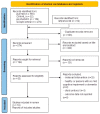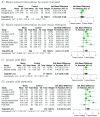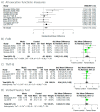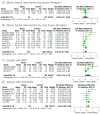The Effect of Music-Based Intervention on General Cognitive and Executive Functions, and Episodic Memory in People with Mild Cognitive Impairment and Dementia: A Systematic Review and Meta-Analysis of Recent Randomized Controlled Trials
- PMID: 36011119
- PMCID: PMC9408548
- DOI: 10.3390/healthcare10081462
The Effect of Music-Based Intervention on General Cognitive and Executive Functions, and Episodic Memory in People with Mild Cognitive Impairment and Dementia: A Systematic Review and Meta-Analysis of Recent Randomized Controlled Trials
Abstract
Background: Music-based intervention has been used as first-line non-pharmacological treatment to improve cognitive function for people with mild cognitive impairment (MCI) or dementia in clinical practice. However, evidence regarding the effect of music-based intervention on general cognitive function as well as subdomains of cognitive functions in these individuals is scarce.
Objective: To evaluate the efficacy of music-based interventions on a wide range of cognitive functions in people with MCI or dementia.
Method: We searched the effect of various music therapies using randomized controlled trials on cognitive function using several databases. Studies based on any type of dementia or MCI were combined. The effects of music-based intervention on each cognitive function were pooled by meta-analysis.
Results: A total of 19 studies involving n = 1024 participants (mean age ranged from 60 to 87 years old) were included. We found statistically significant improvements in MMSE (general cognitive function), the Frontal Assessment Battery (executive function), and the Auditory Verbal Learning Test (episodic memory).
Conclusions: This study provides positive evidence to support music-based interventions for improving a wide range of cognitive functions in older adults with MCI and dementia. Therefore, we recommend increased use of music in people's homes, day care centers and nursing homes. This study was registered with PROSPERO, number 250383.
Keywords: MCI; cognitive functions; dementia; music intervention; music therapy; nonpharmacological therapy.
Conflict of interest statement
The authors declare no conflict of interest. The funders had no role in the design of the study; in the collection, analyses, or interpretation of data; in the writing of the manuscript; or in the decision to publish the results.
Figures








References
-
- Nichols E., Steinmetz J.D., Vollset S.E., Fukutaki K., Chalek J., Abd-Allah F., Abdoli A., Abualhasan A., Abu-Gharbieh E., Akram T.T., et al. Estimation of the Global Prevalence of Dementia in 2019 and Forecasted Prevalence in 2050: An Analysis for the Global Burden of Disease Study 2019. Lancet Public Health. 2022;7:e105–e125. doi: 10.1016/S2468-2667(21)00249-8. - DOI - PMC - PubMed
-
- Clemmensen F.K., Hoffmann K., Siersma V., Sobol N., Beyer N., Andersen B.B., Vogel A., Lolk A., Gottrup H., Høgh P., et al. The Role of Physical and Cognitive Function in Performance of Activities of Daily Living in Patients with Mild-to-Moderate Alzheimer’s Disease—A Cross-Sectional Study. BMC Geriatr. 2020;20:513. doi: 10.1186/s12877-020-01926-9. - DOI - PMC - PubMed
Publication types
Grants and funding
LinkOut - more resources
Full Text Sources
Medical

